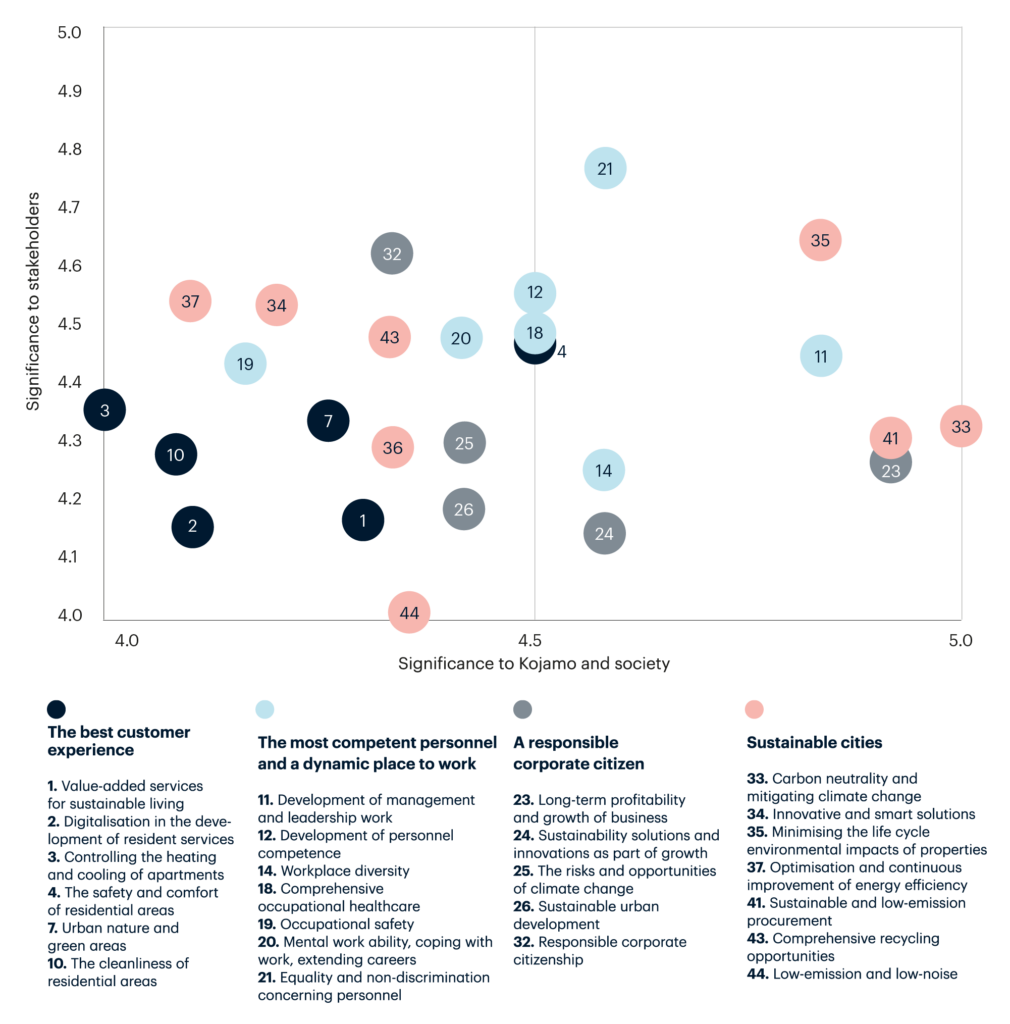Materiality analysis of sustainability
We are prepared for reporting in accordance with the EU Corporate Sustainability Reporting Directive and in 2024, we conducted a double materiality analysis. The results of the analysis will serve as the foundation for our future sustainability reporting and the renewal of our sustainability programme.
Our current sustainability programme is based on a materiality analysis of sustainability that was conducted in 2020. In the materiality analysis, we defined the material sustainability aspects for ourselves and our stakeholders to ensure that our sustainability work is focused on the areas of sustainability most material with regard to our strategy, business operations and stakeholders. The materiality analysis helped us identify Kojamo’s most significant sustainability aspects through an analysis of the views of our stakeholders, our business impacts and effects on society as well as our long-term sustainability work. We also organised workshops for Kojamo’s sustainability steering group and Management Team as part of the analysis.
The views of our stakeholders played a key role in identifying the material sustainability aspects in our operations. We conducted a stakeholder survey to invite our stakeholders to anonymously assess the significance of various material sustainability aspects for Kojamo from their perspective. The study was carried out using online surveys, in-depth interviews and workshops. The study’s participants included Lumo home residents, investors, owners, analysts, our own personnel, our cooperation partners, representatives from government ministries, municipalities, NGOs and the media. We received more than 2,780 valuable responses in total and reviewed the results in detail during the summer of 2020.
The materiality analysis was conducted in accordance with the requirements of the Global Reporting Initiative (GRI) Standards and the EPRA (European Public Real Estate Association) sustainability best practices recommendations. In accordance with the GRI Standards, the materiality of the sustainability aspects was assessed based on the extent of the company’s impact on the economy, environment and society for each aspect as well as the significance of each aspect to the company’s stakeholders.
As a result of the materiality analysis, the material aspects were grouped, based on their significance, into a sustainability materiality matrix. The material sustainability aspects create the foundation for our sustainability programme. Based on the aspects, our sustainability programme received its cornerstones, the four focus areas and the sustainability themes linked to each focus area.
The following focus areas were chosen for the sustainability programme: sustainable cities; the best customer experience; the most competent personnel and a dynamic place to work; and a responsible corporate citizen. The following cornerstones were chosen: ensuring long-term profitability and growth; sustainable and responsible operations; and transparent communications and reporting on sustainability.
These focus areas and the sustainability themes within them constitute our material themes of sustainability in accordance with the GRI Standards framework.
The Management Team approved the results of the materiality analysis and the related materiality matrix in June 2020. The material aspects of sustainability apply to the entire Kojamo Group. Going forward, we will regularly assess whether the materiality analysis is up-to-date. We will also assess this whenever there are significant changes in our operations or the operating environment.

Page updated 4 March 2025